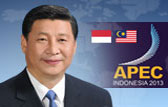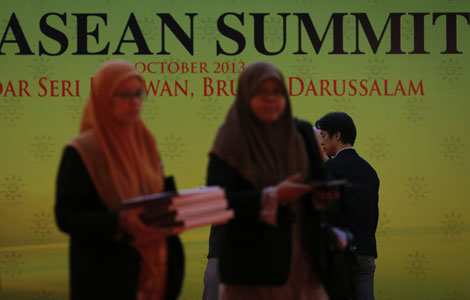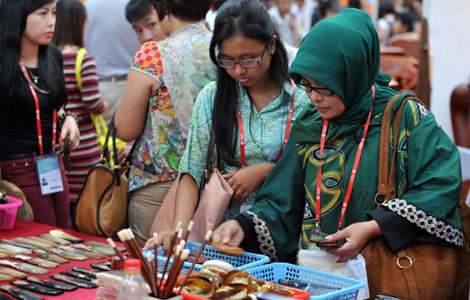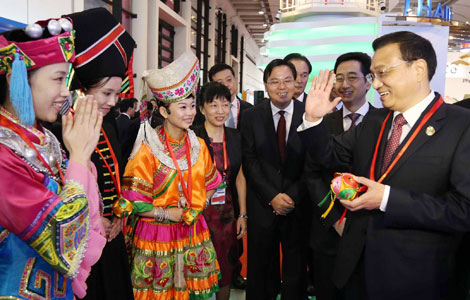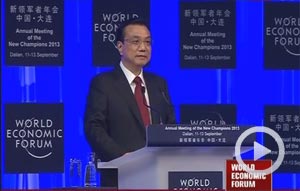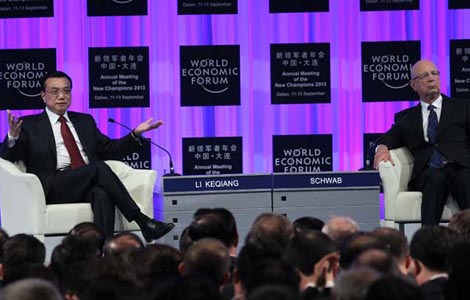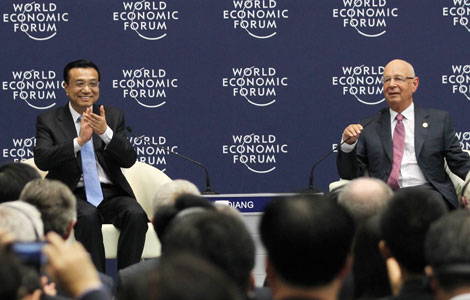
China-ASEAN relationship still thrives
Updated: 2013-10-09 00:49As China enjoys sustained and rapid growth and gains in national strength, China's neighbors have naturally shown doubts and concerns about whether China will seek hegemony once it gets strong. What is the foreign policy of the new Chinese government toward China's neighbors? And what is your view on deepening East Asia cooperation?
It is understandable that such questions are raised. In the history of international relations, there are quite a few stories of big powers vying for hegemony. We therefore understand the concerns of our neighbors, for, after all, China is, in all measures, a major country in Asia.
However, time has changed. In the 21st century, the trend toward peace and development has gained momentum. China has developed in such a peaceful environment and is heading toward national renewal in a peaceful way. We have no reason to change our path of peaceful development. China's cultural values uphold the principle of "not doing to others what you don't want others to do to you". Like many other Asian countries, China suffered deeply from the colonial rule and invasion of Western powers. Since the founding of New China, China has firmly adhered to the policy of opposing hegemonism and power politics. The Chinese nation has no such tradition as seeking hegemony or expansion. And in the past several thousand years, the Chinese nation has developed such philosophy as treating your neighbors amicably, valuing peace above anything else and cherishing harmony in diversity. They constitute the historical foundation for China's policy of building friendship and partnership with its neighbors. China will in no way follow the old pattern of "seeking hegemony after becoming strong".
As a member of the big Asian family, China's destiny is closely linked with those of other Asian countries. China needs a peaceful and stable neighboring environment for development. We will always work for good neighborly relations and mutually beneficial cooperation with our neighbors, and will properly manage differences and disagreements with them. ASEAN is a priority on China's diplomatic agenda regarding the neighborhood. We will firmly support ASEAN in growing stronger and playing a leading role in East Asia cooperation. East Asia cooperation has brought tangible benefits to the region. No matter how the situation may change, a peaceful and stable environment in East Asia must be maintained and our efforts will focus on development and on improving people's lives. At present, we need to concentrate on tackling the underlying impact of the global financial crisis and maintain the momentum of sustained development. As for the direction of East Asia cooperation, China calls for adhering to the "East Asia cooperation spirit", upholding the principles of ASEAN centrality, consensus building and accommodating the comfort level of all parties, which have proved to be effective, and promoting a regional cooperation model with East Asian features. There are multiple regional cooperation frameworks and mechanisms in East Asia. This meets the reality of diversity in the region. China actively supports and participates in cooperation under these mechanisms, and is committed to building a mutually complementary, open and inclusive cooperation environment.
How do you see the impact of the South China Sea question on China-ASEAN relations?
On the question of the South China Sea, China and ASEAN countries have had many in-depth discussions and reached consensus. As long as we stay committed to this consensus and act in accordance with mutually agreed principles, the South China Sea region will stay peaceful and stable.
The core of the South China Sea question is the disputes over the sovereignty of some islands and reefs of the Nansha Islands and the delimitation disputes over some waters in the South China Sea. It is a difficult question built over years, involving the bilateral differences between China and some ASEAN countries. The Chinese government is firmly committed to the path of peaceful development, and is unshakable in its resolve to uphold national sovereignty and territorial integrity. This is why China has persistently sought dialogue with relevant countries and ASEAN to explore effective ways for upholding regional stability. The Declaration on the Conduct of Parties in the South China Sea (DOC), signed among China and ASEAN countries in 2002 is a fundamental document for maintaining peace and stability in the South China Sea. The DOC has established a series of important principles, including: settling relevant disputes by peaceful means; pending the settlement of disputes, the parties concerned undertake to exercise restraint and refrain from carrying out activities that could complicate or escalate disputes; and conducting practical cooperation. These principles reflect the wisdom of Asian countries in handling complicated problems and represent the biggest common interest of all countries. These hard-won principles have provided indispensably conditions for the robust cooperation and economic prosperity in this region. The DOC should be observed and upheld in real earnest. China and ASEAN countries should stick to dialogue and cooperation and effectively safeguard peace and stability in the South China Sea.
China is always firm in upholding peace and security. This meets its own need of development and serves the interests of East Asia. We are deeply aware that without a secure environment, economic development and prosperity would be out of the question. The South China Sea is an important international shipping lane. As a big trading nation, China depends heavily on the unimpeded access and safety of international sea lanes, and also shoulders responsibilities in this regard. Therefore, China places high importance on the freedom of navigation in the South China Sea and cares deeply about ensuring the safety of navigation there. The truth is, the territorial disputes in the South China Sea have not affected the international shipping lane. China will continue to actively advocate and participate in regional maritime cooperation, including maritime security cooperation, and uphold peace and tranquility in this region.
China's economic development has drawn high attention of other countries. Could you brief us on China's current economic situation and its impact on ASEAN and other East Asian countries?
World economic recovery now faces difficulties and there are also many uncertainties in the Asian economy. In the face of the complex international and domestic situation and downward economic pressure, the Chinese government has stood its ground and responded in a calm way. We have maintained stability in and innovated on our macroeconomic policies. On the one hand, we have refrained from expanding fiscal deficit, and neither eased nor tightened monetary policy. On the other hand, we have taken a series of creative policy measures to boost reform, energize the market, adjust the economic structure, and have seized every opportunity to transform and upgrade the economy. These measures are in line with the goal of maintaining steady growth and have effectively kept the economy on an even keel. In the first six months of this year, China's GDP grew by 7.6 percent, and employment rate and overall prices were both stable. Since July, major economic indicators have rebounded, the real economy has been dynamic and market confidence has increased. The Chinese economy now enjoys a strong momentum of steady growth.
China's development is closely linked to that of the world. Over the past 30 years, the Chinese economy has benefited a great deal from opening up. China's rapid growth has also contributed much to East Asia and the world. In the future, with parallel advancement of industrialization, IT application, a new type of urbanization and modern agriculture, China stands a good chance of sustained and sound growth, and will continue to release reform dividends, market potential and innovative vitality. It is projected that in the next five years, China's import will reach $10 trillion, its outbound investment will top $500 billion and its overseas visits will exceed 400 million. China hopes to share with ASEAN and other East Asian countries such tremendous business opportunities and make greater contribution to the development of ASEAN, other East Asian countries and the world. We hope other countries will all play an active part in this process and create greater conditions and a better environment for our cooperation.
